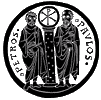Archpriest and Teacher:
May His Memory Be Eternal!
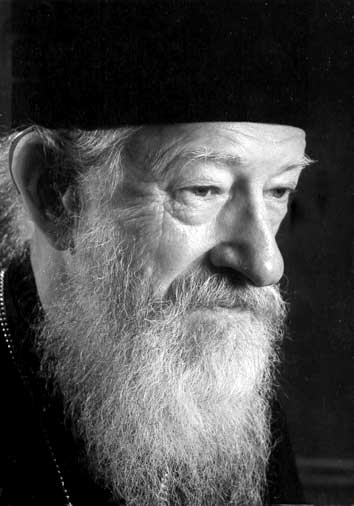
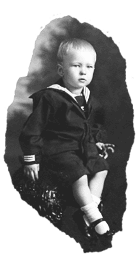 Father John Bockman was born on April 3, 1921 in Libby, Montana, where his father John was the chief of police. The family lived in Libby until some time after the untimely death of his father, who was shot in the line of duty when Father John was only three years old. His mother Albina took a teaching job in Bonners Ferry, Idaho to support herself and her two boys, Father John and George.
Father John Bockman was born on April 3, 1921 in Libby, Montana, where his father John was the chief of police. The family lived in Libby until some time after the untimely death of his father, who was shot in the line of duty when Father John was only three years old. His mother Albina took a teaching job in Bonners Ferry, Idaho to support herself and her two boys, Father John and George.
After a number of years in Bonners Ferry, his mother remarried and bore another son, William. When the family lost everything in the "great depression," they went to Chicago to stay with Albina's family until Father John's stepfather could find work.
Father John entered the Franciscan seminary in Westmont, Illinois, when he was only fourteen years old. (His stepfather had wanted him to drop out of school and take a job in a radio factory.) Father John got his high school and part of his college training in the seminary. He was never ordained to the Roman Catholic priesthood, however, because he contracted pulmonary tuberculosis and had to spend three years in a sanitorium, after which he decided not to go back to the seminary.
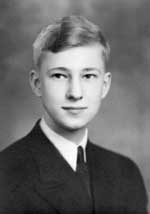
He received his Bachelor of Philosophy degree from Loyola University in Education and German in 1948, and a Master of Arts in English and Education from the University of Arizona in 1949. He then took a teaching job at the New Mexico Military Institute in Roswell teaching at both the high school and college levels.
In 1949 he took a leave of absence from "the Institute" to attend the University of Chicago, where he had been admitted to the doctoral program in Germanic Linguistics. That year he met Valerie Morris, a researcher at the University of Wisconsin in Madison. They were married on April 22, 1950. Later that year, when they were expecting their first child (Mary Elizabeth), Father John decided to terminate his doctoral program and return to teaching at the Institute in Roswell.
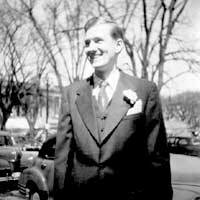
In 1956 the family moved to Hempstead, New York where Father John taught German and English at Uniondale High School. By that time he and Presbytera Valerie had five children. Unwittingly, Father John found himself right in the middle of what he called the "blackboard jungle," after the book of the same name. He saw or experienced all but one of the atrocious events described in the book.
As his and the family's quality of life markedly declined, he decided to go back to take whatever job he could find in New Mexico. Networking got him a teaching job at Cobre Consolidated High School in Bayard teaching Latin, English, and Russian. Eventually he became head of the Language Department. One of the senior classes dedicated their yearbook to Father John.
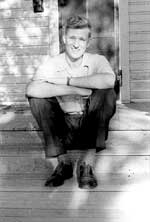
In 1961 he went to Indiana University, Department of Slavic Studies, to pursue further education in Russian under a grant from the National Defense Education Act. Upon completion of the program, he was a Master of Arts in Teaching. A later summer NDEA Russian program took him to Moscow University for further Russian language study.
With the M.A.T. in hand, Father was able to secure a teaching position in the Tucson Unified School District teaching high school Russian and English. Eventually he became a department head. Later he was made Foreign Language Coordinator for the entire school district.
In the meantime, Vatican II had completely disillusioned Father John and Presbytera with the Roman Catholic Church. In 1972 they started going to Holy Resurrection Antiochian Orthodox Church, which they attended for three years with the five of their children who were living at home (John, Tom, Joseph, Andrea, and Father James). After three years they were all received by Chrismation.
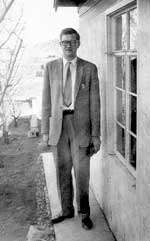
It didn't take long for another disillusionment to set in. They saw the very relaxed attitudes toward fasting (even at church events), the progressive shortening of the services, and other degenerations resulting from uncanonical actions at the archdiocesan level.
Finally they found a tiny, very poor church (they always joked that it was held together with scotch tape and string) affiliated with the Russian Orthodox Church Outside Russia. There Hegumen Innocent served the entire Liturgy, followed the canons, and made a pure confession of the Faith. Father John was eventually tonsured a reader by Metropolitan Antony in Los Angeles.
In 1983 Father and Presbytera took early retirement to move to Ipswich, Massachusetts to serve the Church in whatever way they could in the Parish of Saint John the Russian. The move was a good one. Father John was able to serve the parish in several capacities. He was asked to teach five or six children in different grades, who for one reason or another were having a very bad time in the public school. So Father established Saint John of Kronstadt School in his basement. He selected Calvert School materials — a very high-quality classical program — to teach several different grades, designing completely individualized lessons.
The school was so successful that he soon couldn't meet the demand. He was then asked to start a parochial school open to every grade school child in the parish. It didn't take long for micro management (by someone other than Father John), a conflict of philosophies among the teachers, and inadequate facilities to bring down the school. Even though the ill-conceived parochial school had collapsed, the Bockman basement school was never resumed.
Father John was ordained to the diaconate on the Feast of Saint John the Russian, May 27, 1986, by Bishop Hilarion of Holy Trinity Monastery in Jordanville, New York. Very shortly thereafter the Holy Orthodox Church in North America was formed under the omophorion of Archbishop Auxentios of Greece, and Father Ephraim, monk, was consecrated its first Bishop in America. Saint John the Russian Parish was among those forming the new diocese.
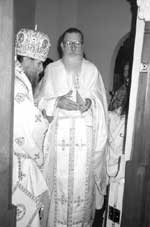
On the Feast of Saint John the Russian on May 27/June 9, 1989, Father John was elevated to the priesthood by Bishop Ephraim. He served at Saint John the Russian Parish until the pastor and a group of parishioners went back to ROCOR. Those remaining formed a new parish in Ipswich called Saint John the Confessor.
At about this time several Evangelical Protestant families, who had been converted to Orthodoxy through the Antiochian Archdiocese, became concerned about having only "half a loaf," so to speak. Wanting a jurisdiction with a pure confession of Faith and a more strict adherence to the canons, they petitioned Bishop Ephraim to receive them. They were received by Baptism, and Father John was asked to go to Tennessee periodically to serve. The new mission was named for the Holy Apostles Peter and Paul. Before long they requested that Father John become their full time priest. Unable to move immediately, he continued the long periodic commute to Tennessee for another year.
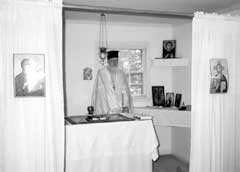
During that year, Father John and Presbytera found a home in Brentwood and set up a chapel in a large activity room. Father James and Presbytera Nicolette were married there by Father John. Also, THE STRUGGLER was started as a parish newsletter and developed into a diocesan publication providing a bulletin service to about six parishes.
But before long the parish began to melt away before their very eyes. All except one family returned to their previous jurisdictions. Returning to Massachusetts, Father served as assistant priest at Saint John the Confessor Parish in Ipswich. His son, Father James, had been ordained to the priesthood to serve a new parish in the Salt Lake City area.
Father and Presbytera came to realize, given some of their Brentwood and Topsfield experiences with weather-related mishaps, that they should not be living so far, geographically, from all of their children. Having no parishioners, they put their home up for sale, intending to move to Salt Lake City to be with Father James and his family..
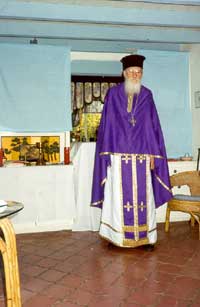
In October 1997 they were called to Tucson when their eldest daughter, Mary Beth, became deathly ill. Shortly after their arrival in Tucson their Topsfield home sold, and they had to start looking for a place to live after Mary Beth's recovery. Providentially, they found a home only three blocks from Mary Beth's. Regardless of the direction of the caregiving, parent to child or child to parent, it was an ideal location.
Once again the Mission of Saints Peter and Paul was established in their home. Gradually people heard about it and came, until there were as many as seventeen. However, the size and composition of the group keeps changing.
While attending the clergy synaxis in October 1998, Father John was raised to the rank of Archpriest. In all the years that he was a priest, he missed only one clergy synaxis, and that because he was recovering from surgery.
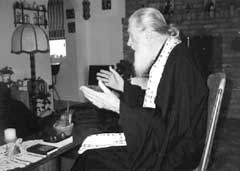
In March of 2000 the Bockman offspring and their families gathered to celebrate their parents' fiftieth wedding anniversary. Only eight months later, on Thursday, November 9, 2000, Father John spent the latter part of his day baking prosphor. In the evening he complained of abdominal pain, which became so severe that he asked Presbytera to take him to the hospital. On the way, Father gasped out the Jesus Prayer as he moaned with pain. At one point, when they had stopped for a red light, he suddenly stopped moaning. Presbytera asked if the pain were coming in waves, and he said he didn't know because that was the first respite he had had. Then as they proceeded through the intersection, he started to yell very loudly. It lasted for about a block, and then he suddenly fell silent and did not respond to Presbytera's questions. When they arrived at the hospital, he had no pulse and no respiration.
Father was resuscitated, and then sedated so that the doctors could work on him without his struggling against them. Many tests were run, but they were never able to come up with a diagnosis. He was put on a respirator and given drugs to stimulate his heart, but to no avail. He reposed in Presbytera's arms at a little after midnight, November 10, 2000. When Presbytera got home that night, she found that Father John had turned on her bedside light so that she would not have to make her way into a dark room.
Before Father John reposed, while the doctors were still working on him, Presbytera had called Father James in Virginia to request that he read the prayers for the dying.
Father lay in state in his beloved house church where memorial services were served by Father James every evening. His funeral was at Saint Mark's Cathedral in Roslindale, Massachusetts, on November 16. There Metropolitan Ephraim and a large contingent of clergy (including Father James) chanted the funeral service for a priest. In a beautiful burial service he was interred at Gethsemane Cemetery in West Roxbury.
Father John is survived by his wife, Presbytera Valerie, all nine of his children, and sixteen grandchildren. The children are: The newly-illumined Mary Beth Lytle (antique doll restorer and costumer), Margaret Putman (neonatal nurse practitioner), John (teacher of English as a second language), Paul (Paul Bockman Trucking Company), Clare Bell (violinist and sixth grade teacher), Thomas (industrial arts teacher), Joseph (social services administrator), Andrea Christensen (office manager), and Father James (priest and electronics engineer).
All of the children who have had birthdays since Father John's repose told of how much they miss his annual birthday call. His birthday calls followed a playful, game-like formula. He would ask how old they were now, twenty-nine? And when they told him their age, he would draw air through his front teeth in a slight hiss of feigned surprise and amazement.
Kind and gentle Father John is sorely missed — by his wife, his children and grandchildren, his missioners, and the parishioners of Saint John the Confessor in Ipswich. His homilies and his insightful articles for THE STRUGGLER will also be sorely missed.
In one of his references to Father John, Metropolitan Ephraim quoted, "Well done, O good and faithful servant." May Father John, and all of us, hear those words when our Savior "come[s] again in glory to judge both the living and the dead" and be taken into His "Kingdom [that] shall have no end" (Nicene Creed).
Presbytera Valerie Bockman
Dear Andrea,
[The first paragraph is about alms from Saints Peter and Paul Mission to help get the things that Rick (Andrea's husband) needs. Forty-year-old Rick is dying of cancer.]
Life is trying you hard, Andrea, and you are suffering a great deal. We are suffering along with you, and we hope and pray you can believe that. You can see how little one person can do to relieve the suffering of another. Most often this co-suffering must be done in silence, and the silence is difficult to bear. But the noise and clamor and protestations of the world are "as sounding brass, or a tinkling cymbal," signifying nothing, because they have little to do with true love. "Love suffereth long" (I Cor. 13:4).
Do you remember the words of the troparion we sing at Pascha? "Christ is risen from the dead, trampling down death by death, and on those in the graves bestowing life." I would recommend that you sing this silently to yourself, often. It is our only hope — that Christ rose from the dead in order that we also may rise with Him to eternal life.
God bless you, Andrea.
With all my love,
Your father
Dear Andrea and Rick,
Upon our arrival back from Boston [for the clergy synaxis in early October] we received your recent e-mails. Many thanks for them. I am finding it difficult to write about matters of life, illness, and death, especially since we now lack a common religious consensus within our large family. We do rejoice with your every success, and we do groan with your every setback.
We are terribly sorry that you, Rick, [along with] Andrea and the children, have had to undergo such severe torment, fear, and anguish at this time in your lives. We are quite sure that the only really important thing we can do is pray for you, as you have requested. We are sorry if we have often become distracted by matters affecting ourselves and have made you wait for a response from us. Be assured, however, that we do pray for you frequently throughout the day. We do try to follow the Savior's counsel: "Watch, praying at all times" (Luke 21:36). And we will continue to do so, asking the Lord to have mercy on [all of you].
Since I myself do not have the wisdom to find my own right words at a time like this, let me ask you to read and consider the following passage from a homily commenting on words of Saint Paul which appear at the end of the following paragraph:
"Be not grieved, saying ‘Why do we suffer such and such things?' For when we refrain from grieving our victory becomes more glorious. And it would not be glorious unless Christ had destroyed death by death; but the most wonderful thing is that Christ conquered the devil by the very means by which the devil was strong, namely, by death. By distroying death by death, Christ showed in every point the abundance of the means at His disposal, and the excellence of His powers. Let us not then prove false to the gift which Christ has bestowed on us, namely, the gift of freedom from fear. For as Saint Paul says, ‘We have received not a spirit of fear, but a spirit of power, and of love, and of a sound mind' (Rom. 8:15; 2 Tim. 1:7). Let us stand, then, nobly laughing death to scorn" (N&ANF;, 14:385).
It is recorded in several places that the Lord's disciples had misgivings about the counsels He was preaching among men. They wondered whether any man would be able to follow them. One of these instances occurred when a young man approached the Lord and wanted to know what good thing he could do to gain eternal life. The Lord told him that if he wanted to be perfect he should go sell all that he had, give to the poor, and come follow Him (Matt. 19:21). But the young man had many possessions and could not follow the Lord's counsel. When the Lord declared that it would be easier for a camel to pass through the eye of a needle than for a rich man to inherit the Kingdom of Heaven, the disciples asked, "Who then can be saved?" The Lord responded, "With men this is impossible, But with God all things are possible" (Matt. 19:26).
"To nobly laugh death to scorn" is certainly "impossible" for men. Just as it is "impossible" for men to love their enemies. Just as it is "impossible" for men to achieve perfection ("Be ye perfect as your heavenly Father is perfect" (Matt. 5:48). But, nevertheless, Christ said, "with God all things are possible." From this we understand that God is able to work those things in us which we cannot work by ourselves. But to be able to do such things, we must cooperate with God in all the various ways which Christ has revealed. If we can become spiritually strong through obedience to all of Christ's counsels, we can become strong enough to nobly laugh death to scorn.
When we were in Ipswich the second week of October, I was asked to give the homily at the church on October 15. When we got back home, Mama typed up my notes. I am sending you a copy, hoping that it may be of some help to you.
We have requested prayers for you from Holy Transfiguration Monastery and Holy Nativity Convent in Brookline, Massachusetts, and from Saint Gregory of Sinai Monastery in Kelseyville, California.
Let me call your attention the the following passage from the First Letter of Saint Paul to the Corinthians (15:53–57): "This corruptible must put on incorruption, and this mortal must put on immortality. So when this corruptible shall have put on incorruption, and this mortal shall have put on immortality, then shall be brought to pass the saying that is written, ‘Death is swallowed up in vistory. O death, where is thy sting? O grave, where is thy victory?' But thanks be to God, which giveth us the victory through our Lord Jesus Christ."
Finally this: "Let your loins be girded about, and your lights burning. And ye yourselves like men that wait for their lord, when he will return from the wedding; that when he cometh and knocketh, they may open unto him immediately. Blessed are those servants, whom the lord when he cometh, shall find watching" (Luke12:35–37).
Sincerely,
Fr. John
Father John reposed very suddenly on November 10, 2000, and Rick, after nine months of intense suffering, on December 11, 2000.
